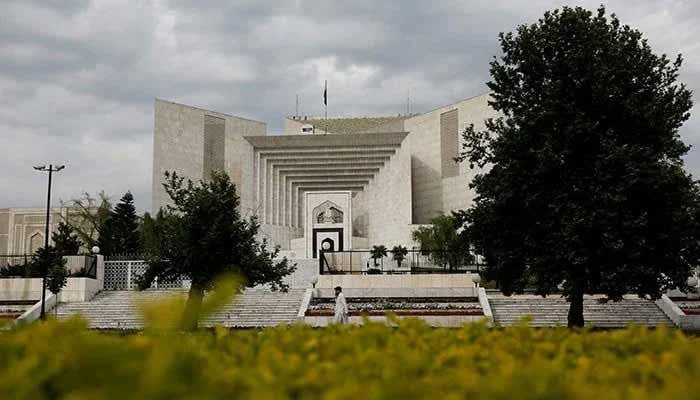
A man uses his mobile phone as he walks past the Supreme Court of Pakistan building in Islamabad on May 13, 2023. — AFP
#SJC #amends #code #conduct #restricts #judges #media #interaction
ISLAMABAD: The Supreme Judicial Council (SJC) has revised the code of conduct for judges, prohibiting them from speaking to the media or participating in any public debate on political issues.
Chief Justice of Pakistan and SJC Chairman Justice Yahya Afridi presided over the meeting in the Supreme Court of Pakistan.
The meeting was virtually attended by Justice Syed Mansoor Ali Shah and Justice Muneeb Akhtar of the Supreme Court of Pakistan through video link, while Justice Alia Neelam, Chief Justice, Lahore High Court and Justice Sardar Muhammad Sarfraz Dagar, Chief Justice, Islamabad High Court participated in Islam.
According to an amended code of conduct issued on Saturday, a judge should not engage in any public controversy, whether by speech, writing, debate or comment in any forum, and at least on political questions, even if such questions involve questions of law. “
“[Judges] There will be no interaction with the media, especially in relation to matters which may give rise to public debate or may adversely affect institutional collegiality and discipline.
The new provisions reverse an amendment made during the tenure of former Chief Justice Qazi Faiz Isa, which allowed judges to respond to public charges.
According to the newly added Article 15, the judges will now have to submit a written reply to a committee – consisting of the Chief Justice of Pakistan and four senior judges – through the Registrar of the Supreme Court for an appropriate institutional response.
Article 15 states that judges should perform their duties solely on the basis of merit, free from all internal or external influence.
According to the clause, a judge is required to maintain intellectual integrity and moral independence, using all available legal options to counter any attempts to impose pressure.
If immediate legal means are not available, the judge must report the matter in writing to the Chief Justice of the High Court concerned, the Chief Justice of Pakistan, and the four senior most judges of the Supreme Court through the concerned Registrars.
If the Chief Justice of the High Court or the committee fails to respond within the stipulated time, the Chief Justice of Pakistan and the four senior judges of the Supreme Court will ensure institutional accountability and judicial independence.
Under Article 13, judges are prohibited from requesting invitations to attend meetings, conferences, or events of foreign or international organizations.
The code of conduct states that if a judge receives such an invitation, it should be sent for approval by the concerned Chief Justice instead of accepting it directly.
The SJC made clear that seeking an independent invitation would constitute misconduct, reinforcing the principle that judges should avoid situations that could compromise impartiality or create the appearance of bias.
The SJC reviewed 67 complaints
The SCJ also considered 67 complaints under Article 209 of the Constitution filed by various individuals. “65 complaints were unanimously decided to be filed and one complaint was unanimously decided to be adjourned while one complaint was decided to be further processed by a majority decision,” the statement added.
The reconstituted Council examined seven complaints under Article 209 of the Constitution filed by various individuals. Five complaints were unanimously decided to be filed while two complaints were decided to be further processed by a majority decision.
After adjudicating the current 74 complaints, there are 87 pending cases requiring preliminary consideration, and the SJC has attended 155 since October, 2024.






